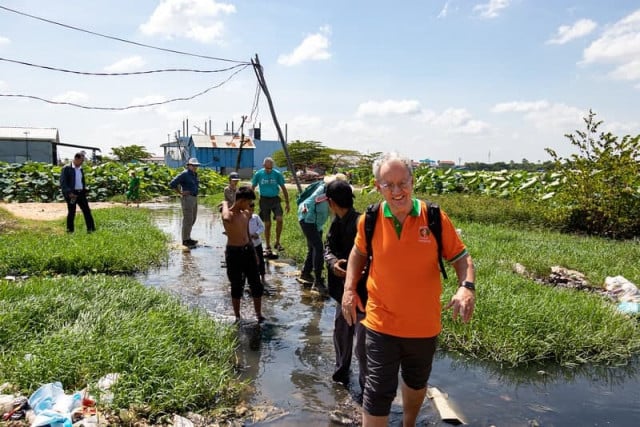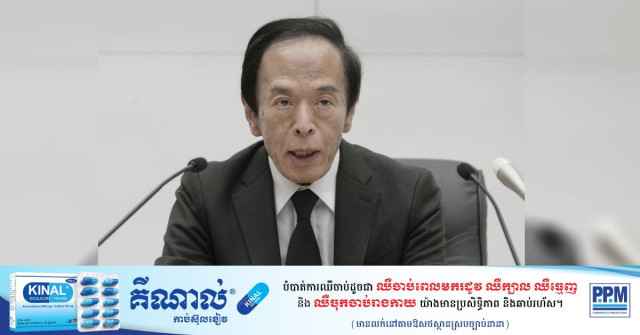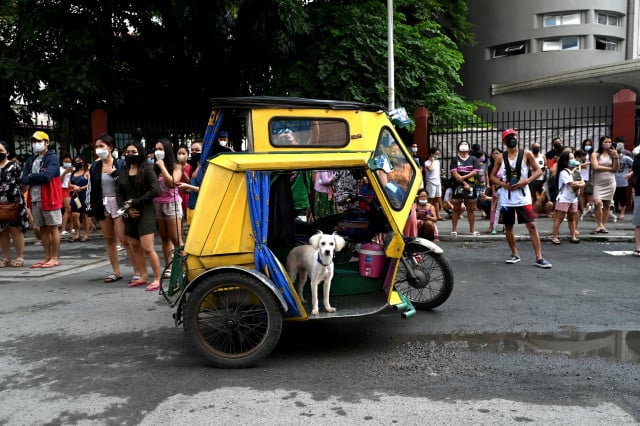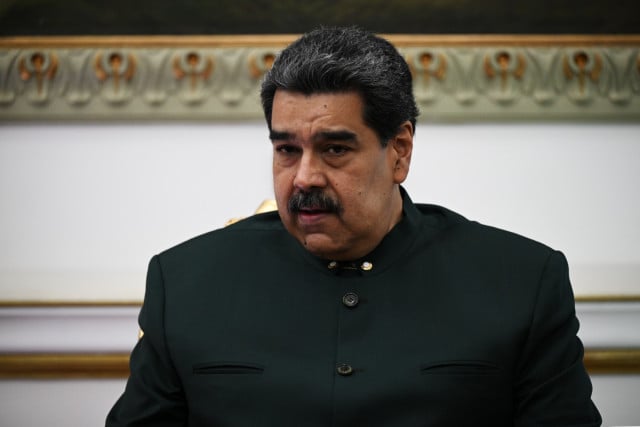Invisible but Real: the Strain that COVID-19 Has Put on People’s Mental Health

- Michelle Vachon
- January 6, 2021 10:36 AM
As COVID-19 turns 1 year old, the damage caused in people’s lives goes beyond the obvious
PHNOM PENH--On Jan. 7, 2020, the Chinese authorities managed to isolate the new type of coronavirus that had been reported to the World Health Organization China office on Dec. 31, 2019.
China shared the genetic sequence of the Coronavirus Disease 2019 on Jan. 11 and 12, 2020, and since then, what became known as COVID-19 has wreaked havoc, bringing countries’ economies to their knees and leading to a death toll now approaching 2 million.
In Cambodia, as people lost their jobs—whether in tourism, the garment sector or other businesses in turn affected—one of the needs that has surfaced is what Father Kevin Conroy calls “psychological first aid.”
This, he explained, “because of the mental health crisis that’s going to develop due to COVID-19: no fault of Cambodia, just a reality.”
Conroy is a Catholic priest in Cambodia since 2006. A US psychologist who is director of the Maryknoll Mental Health NGO in the country, he has been involved in a mental-health outreach program in the countryside. Conroy has also assisted the Royal University of Phnom Penh set up the master’s degree program in clinical psychology and he currently oversees master’s degree students in the field.
Over the last year, migrant workers have had to go back to their villages because of the pandemic with no idea how they would manage to support their families or what would happened next: "The International Organization of Migration believes that, in Prey Veng Province alone, 100,000 people have returned,” Conroy said.
“The depression is coming: The need for those folks is going to be real,” he said. “Those families are going to need support from the village. And even internally, the migration with those garment factory workers going back to their villages…That’s putting stress on the village and the villagers.
“So all that stress on the village is going to show itself in various ways and we should all work together to make this as painless as possible [for everyone],” Conroy said.
However, this may prove the more difficult to do that the Cambodian government as well as NGOs’ resources have been affected by the pandemic.
Cambodia has seen its revenues linked to tourism and the garment-industry evaporate as these sectors collapsed.
And NGOs wishing to modify their programs to meet people’s needs triggered by COVID-19 also may face budget issues as countries that usually provide them with funding have to deal with their own economic and healthcare crisis, Conroy said.
What is more, Cambodia has limited psychiatric and psychology services to start with, he said. Psychiatrists and psychologists are mainly based in Phnom Penh where the few facilities are, leaving people in the provinces with little, if any, access to mental health services, he said.
“That’s what makes this disaster in some ways unique as far as Cambodia [is concerned],” Conroy said. “And so, I think that the stress levels are definitely up—and the hunger level.”

A history that makes COVID-19 more difficult for Cambodians to cope with it
As far as following directives from the Ministry of Health such as wearing masks and frequently washing one’s hands to prevent the spread of the disease, Cambodians have done this without making an issue of it, Conroy said. “They will believe the doctor.”
But two factors make the pandemic even more of a shock for Cambodians than it does for people in other countries: trauma and poverty, he added.
“[Y]ou can’t talk about mental health in Cambodia without talking about trauma and how people deal with trauma,” he said. “We know that trauma gets transmitted from generation to generation.”
Researchers now believe that trauma is transmitted in people’s genes as are their physical characteristics and intelligence traits. “That idea would have been laughed at 20 years ago,” said Andrew Curry, in a July 2019 issue of “Science,” an online publication of the American Association for the Advancement of Science. “But today the hypothesis that an individual's experience might alter the cells and behavior of their children and grandchildren has become widely accepted.”
In Cambodia, the terror and suffering that people endured during the wars and Khmer Rouge regime of the 1970s and 1980s have been transmitted to their children and grandchildren. And because of this, their emotional reactions to the hardship caused by COVID-19 may be more profound than that of populations in other countries, Conroy said.
Then, there is poverty that, in spite of progress made over the last two decades, remain widespread in Cambodia and has been exacerbated by the pandemic.
For some time, Conroy and his team had been dealing with these issues in villages.
“We never talk about money: We always talk about how we can help people with, let’s say, depression and anxiety, help them deal with that problem,” he said. “You go back a year later and, all of a sudden, the village leader might say something like, ‘You know, we have more money now. We seem to be, you know, functioning better as a community.’
“Well, it’s because they were able to deal with the mental-health piece and a real important part of mental health isn’t just giving medicine: It’s getting the person functioning…If you can help people to recognize they have a function and a mission, and maybe learn some things about mental health that could help—we call this psycho-education—…all of a sudden, they start to function better,” he said.
So one crucial issue during the pandemic is to find people who lost their jobs something productive to do not only to earn a living but also to find a purpose, Conroy said. “It’s all about adaptation.
“Cambodians are farmers: Develop that so people can get a livelihood through that somehow,” Conroy suggested. The more so that jobs in sectors such as tourism may take time to reappear due to COVID-19.
School closures: stress for parents and long-term effects on students
A major outcome of the pandemic has been school closures and all the difficulties this has caused across the world.
One consequence has been, Conroy said, “the impact on parents. Having to raise a child 24/7: the stress level of parents. Cambodians never had mothers before who were working and raising children like they do now. This is the first generation that’s gone into that.” Even though women worked in the past, less of them were pursuing careers on equal footing with men as they now do in Cambodian society.
So the pandemic brought home working men and women who were used to only spend evenings and weekends with their children. In addition, parents able to work from home have had to find ways to keep their children away while they do so, which could be easier said than done. This has added to parents’ stress during COVID-19 as many of them were dealing with fears of not being able to feed their families.
Then, there will be the effect on students, Conroy said. “Few people had in mind at the beginning of [2020] of doing online education programs for the children of Cambodia. It just was not in the plan; it was not in the budget.” The Cambodian authorities were aware that some students from poor families or in the countryside had limited internet access, but this was not an urgent issue until COVID-19, he said.
Still, no matter how steady internet connections or good online programs are, online school cannot replace the real one, Conroy said.
“How do you teach online a first grader, a kindergartener with [their very short] attention span,” Conroy said. “It’s all about adaptation…Most of what a child learns in school isn’t in the books: It’s in the relationships, it’s in the social [interaction].
“I would say 45 percent of what they learn might come from their relationships at school as opposed to what’s in the books,” Conroy said. So, no matter how good online school programs will have been in 2020, students over the world will have missed on what school years are meant to provide.

Dealing with the pandemic on a personal level
In March 2020, Conroy and his team who were providing mental-health care in the countryside refocused their work in view of COVID-19. Their message to the Ministry of Health was, he said, “we’re all in this together.”
With the ministry’s support, they have gone to villages—even when the authorities prohibited travel to prevent the spread of the coronavirus—bringing masks and disinfectants for villagers as well as seeing people under their care.
The approach they tried to develop is basically “psychological first-aid,” Conroy said. “It’s about listening and relaxation and all those things we also try to promote in our approach.”
When unemployment goes up, people’s mental health is affected and depression sets in, he said. “Poverty: That socio-economic issue will affect mental health without a doubt.
“I mean, all this [job losses, school closures and so on] has created a challenge for people,” Conroy said.
Since normalcy may take some time to return, what is important right now is for people to take care of themselves as much as possible, he said. “It’s all about selfcare,” Conroy said.
This involves issues as basic as sleep, he said. “It’s important to sleep right, you know.”















